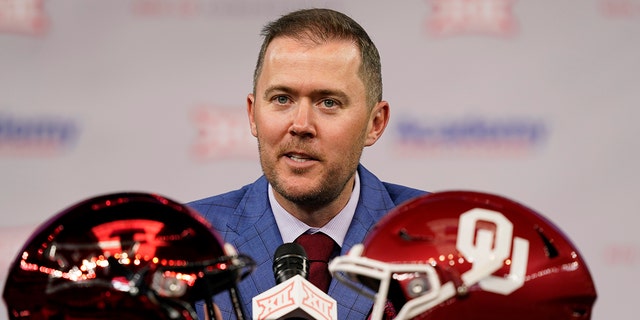Fox News Flash top headlines for July 22
Fox News Flash top headlines are here. Check out what’s clicking on Foxnews.com.
In 2011, almost exactly 10 years ago today, OutKick launched as an independent website amidst the chaos of conference realignment. It was during conference realignment that many of you still reading OutKick today first became aware of me and this site.
With news breaking a few hours ago that Texas and Oklahoma have inquired about joining the SEC, it’s deja vu all over again.
Confession: These are my favorite types of stories out there. I love the complexities of business, politics, sports, and the future of college athletics all being rolled into one complex chess match.
Oklahoma head football coach Lincoln Riley speaks from the stage during NCAA college football Big 12 media days Wednesday, July 14, 2021, in Arlington, Texas. (AP Photo/LM Otero)
Well, according to SEC bylaws, 11 of the 14 SEC schools would have to vote in favor of extending offers to Texas and Oklahoma.
That means four SEC schools would need to vote no to keep this from happening.
So how would the SEC schools vote? It’s a great question. I don’t think SEC commissioner Greg Sankey would bring a vote unless he was confident the conference members would vote to expand.
Having said that, in past years, Georgia, Florida, South Carolina and Kentucky have banded together to agree to vote against any other schools in their respective states from receiving an offer. That kept Georgia Tech, Florida State, Louisville, and Clemson from ever receiving an offer to join the SEC. Since that quad was formed, Texas A&M has now entered the SEC as a new member. In theory, these five schools could join together and bar a school like Texas from receiving an SEC invite.
But does that alliance still exist? And might Georgia, Florida, Kentucky and South Carolina, seeing Texas A&M begin to rise, actually prefer that the Aggies had in-state competition in a football crazy state like Texas? It’s a fantastic question.
Furthermore, what would Texas A&M and Missouri, two schools that left the Big 12 partly because of Texas’ influence, think about the idea of the Longhorns coming back into the conference?
There are reports already that both schools would vote no, but how might additional money and SEC realignment change the voting calculus?
Which brings us to a second question.
2. What would a 16-team SEC look like?
If the SEC went to 16 teams, the conference would abandon two divisions and make four new divisions of four teams each. You can imagine the battles over these divisions.
But a 16-team SEC would actually make scheduling easier, in many ways. If SEC teams stuck to eight conference games, the teams could play the three teams in their division every year, two yearly rivals on an annual basis, and then play the remaining five teams one year and the other five teams the next year.
This way, the SEC would ensure that every conference team played every other conference team, road and away, every four years. So in theory, a football player would graduate having played in every venue. Right now, the SEC can go 12 years between some schools completing road and home schedules.
Furthermore, what if the SEC fought for automatic bids for each of its division champions in the college football playoff? I’m not sure that could happen, but if you knew you only had to finish first in a four-team division, NFL-style, to make the playoff, that could be one heck of a bargaining chip.
3. Can Texas and Oklahoma get out of their Big 12 TV contracts with ESPN and Fox?
Yes, in four years when their existing TV contracts expire in 2025, every school effectively becomes a free agent.
The grant of rights agreement ceases to exist at that point.
But what about Texas’ Longhorn Network agreement?
That deal runs with ESPN until 2031, but ESPN controls the Longhorn Network and ESPN also controls all the rights to the SEC for the next 20 years.
So the Longhorn Network could easily be rolled into the existing SEC rights package. (The payment to Texas for the Longhorn Network is roughly analogous to what every SEC school makes from the SEC Network now.) ESPN might even turn the Longhorn Network into a permanent SEC Network 2.
Yes, ESPN could commit to not one, but two SEC networks.
4. What can the Big 12 do to keep this from happening?
Texas head coach Steve Sarkisian speaks during the NCAA college football Big 12 media days Thursday, July 15, 2021, in Arlington, Texas. (AP Photo/LM Otero)
You can expect a fight.
A big one.
There might even be lawsuits.
Oklahoma State would do its best to exert political pressure on the Oklahoma legislature to keep the Sooners from leaving. Texas Tech, Baylor and TCU would work as hard as they could on the Texas legislature to keep the Longhorns from bailing.
The departure of Texas and Oklahoma would drastically weaken the value of the remaining eight Big 12 teams.
I’ll leave it to better political experts than me to figure out the likely outcome, but if Texas were smart it could argue its departure likely elevates Houston into the Big 12, putting Cougar fans in their corner. And, remember, many people out there said it would be impossible for Texas A&M to leave the Big 12 too.
You may recall there was even a political action committee formed to argue in favor of saving Texas college football.
The Aggies overrode that opposition to join the SEC.
While the Big 12 can file lawsuits galore, ultimately if Texas and Oklahoma want to leave, I think it would be hard to keep them from doing so, absent major actions undertaken by the local state legislatures. And if, say, one of the legislatures tried to keep this from happening, that legislature could be undercutting the leverage of other schools.
If Oklahoma left for the SEC, Oklahoma State would want to get to another major conference. So too would the other schools.
This could rapidly turn into an ‘every school for itself’ situation, with conference musical chairs leaving some unfortunate schools without a home when the music stops playing.
5. What does Texas A&M want and how many allies does it have in the SEC and the Texas legislature?
Presumably the Aggies would like to remain the only SEC team in the state of Texas. That provides a substantial recruiting advantage to the Aggies now and it was one of the primary reasons they left the Big 12 a decade ago.
A cynic would point out that Texas suddenly wants to join the SEC right as A&M rises to new heights under Jimbo Fisher.
But would a new four-team division of Texas, Texas A&M, Arkansas and Oklahoma really be bad for the Aggies? Wouldn’t a reunion of the old Southwest conference powers arguably be outstanding for all of those teams? And, again, what if the SEC could dangle a playoff spot to every division winner? Then you’d only have to beat three schools to play for a title every year.
6. Who leaked this story?
The Houston Chronicle broke this story, specifically a Texas A&M beat writer, Brent Zwerneman.
And it was broken on the very day Texas A&M was appearing in Birmingham, just in time for them to speak to the largest possible media contingent of the year.
That’s awfully convenient, don’t you think?
So this feels like a targeted intentional leak as opposed to a story that just happened to break coincidentally. Which brings us to the next question: was this a targeted leak designed to make Texas and Oklahoma to the SEC more or less likely?
My read here would be the leak was designed to make it less likely.
Keeping a story like this quiet until the last possible moment is the best way to make a move like this happen. Leaking a story such as this allows political pressure and opposition time to organize. Silence is the asset of the stealthy move.
So my bet would be the leaker(s) are in favor of the status quo and don’t want Texas or Oklahoma heading to the SEC.
7. Why would Texas and Oklahoma want to leave the Big 12 for the SEC?
The answer is pretty straightforward, money. And prestige. And more money based on a massive increase in potential ticket sales with yearly SEC competition. I know many of you are already arguing Texas and Oklahoma would have a tougher route to the playoff from the SEC, but I don’t necessarily believe that’s true.
Why?
Because right now conference champions aren’t given automatic bids in a 12-team expanded playoff. Plans call for the top six highest-ranked conference champions and then the next highest-ranked six teams.
An SEC with Texas and Oklahoma could lay claim to half of the yearly playoff bids in some years. And it would probably lead to a reworking of the number of conference champions offered spots.
Heck, it could even lead to an argument in favor of 16 playoff teams.
And don’t forget the idea of a SEC division champ getting its own playoff spot either.
But all that would be in the future.
In the meantime, how smart does SEC commissioner Greg Sankey look for advocating for the largest possible playoff? The bigger the playoff, the less Texas and Oklahoma stand to lose by joining a new conference.
Finally, Texas and Oklahoma in contacting the SEC are implicitly acknowledging that branding matters and that the Big 12’s brand isn’t strong enough. The best recruits want to play against the best competition. That’s the SEC.
8. What about the other conferences, could they make runs after Texas and Oklahoma?
This is where things get even more fun.
Could Texas and Oklahoma have leaked this news to try and create a public bidding war, pitting the SEC, the Big Ten, the Pac-12 and the ACC all against one another in an effort to garner their services? Sure.
Rather than maneuver quietly behind the scenes, these schools may have theorized that a leak drives up their purchase price. Or allows them to extract a massive ransom/extortion payment from the other Big 12 schools.
And if the Big 12 finally implodes, what might happen elsewhere with other teams? You can see a move where West Virginia and Kansas could make sense to the ACC, for instance, to get the ACC to 16 teams as well. How about Notre Dame and Kansas as full-time additions to the ACC? The odds of the ACC standing still are slim, I think, if the Big 12 implodes.
Meanwhile, could the Big 12 try and expand and add BYU, Boise State and Houston in an effort to protect itself? Definitely.
Could the Pac-12 make a run at Kansas, Oklahoma State, Baylor, and Texas Tech to get to 16 teams itself? What about BYU and Boise State to the Pac-12? And how would the Pac-12’s academic standards play in here?
And how about the Big Ten, the SEC’s true competition? Could the Big Ten go after Texas and Oklahoma and bid against the SEC? How about the Big Ten going after Notre Dame and Texas? Or what about the Big Ten trying to grab Kansas and Notre Dame? Who knows what the Big Ten’s counter punch to the SEC’s punch might be.
Finally, don’t discount the idea of Texas going completely independent, or at least threatening to do so.
9. What does ESPN want?
Remember, ESPN is putting up the money here. It is the reason why Texas and Oklahoma might want to go to the SEC.
ESPN is going to have to pay a king’s ransom to make the SEC even more powerful than it is today. The reason the SEC isn’t still with CBS in the years ahead is because CBS refused to reward the SEC for adding Texas A&M and Missouri. There’s no way the SEC would make this move without everyone making a lot more money.
And that money would mostly be coming from ESPN since ESPN controls all the SEC’s rights going forward.
In fact, you could even see an argument where ESPN suggests the SEC create its own digital network and start charging for additional premium content on ESPN+, UFC style.
One big change since the SEC Network launched in 2014 is brands matter more than new markets in a post-cable bundle era.
It used to be conferences wanted new states to increase the payout for their networks, now they need better brands to cut through the noise. Texas and Oklahoma are two premier brands that would increase the buy-in for the SEC as a premium product.
A 16-team SEC with Texas and Oklahoma wouldn’t be primarily competing with the rest of college football any longer, it would be competing with the AFC and the NFC.
Which is why the best asset the Big 12 would have if Texas and Oklahoma bolted would be ESPN’s potential legal liability. If ESPN has a TV contract with the Big 12, how can it also be the primary financial reason Texas and Oklahoma are leaving?
That would seem to violate the network’s fiduciary duties of good faith to its existing contractual partner. That’s why I think it’s altogether possible ESPN might have to pony up substantial money to the remaining members of the Big 12 in an effort to keep those conference members from suing them.
Remember, that’s what happened last time when the Big 12 seemed on the verge of doom. Colorado, Texas A&M, and Missouri all left the Big 12 and despite losing a total of three teams the Big 12 was able to get a large TV contract from ESPN and Fox.
Why?
Because ESPN had potential legal liabilities if the remaining Big 12 schools had sued.
That situation is still at play now.
Meaning the Big 12, a dead conference walking for some time now, might still have a future, albeit an even more tenuous one, even without Texas and Oklahoma in a post 2025 collegiate landscape.
Buckle up, there are a ton of legal complexities here that are going to be fun to watch play out.
I can’t wait to see it all.
Realignment madness is back, baby! And OutKick is going to be all over it, just like we were a decade ago when this site launched.
Source: Read Full Article



